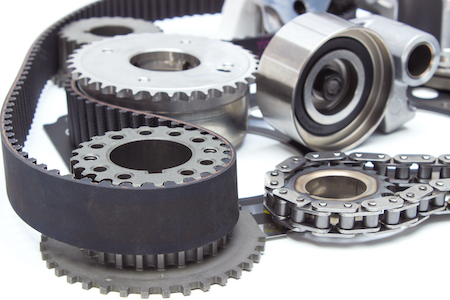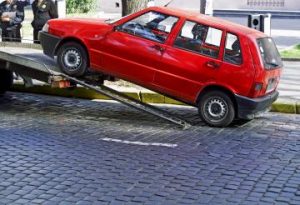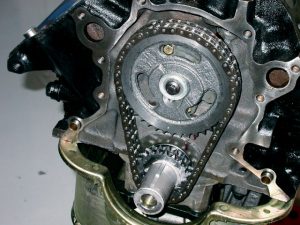The heart of your vehicle is the engine. Without an engine, your car simply won’t go.
Since the very first car, the engine has been vitally important to keeping your vehicle running. Over the years, the engine has been upgraded for precision to give you the smoothest ride possible in the most efficient way. To ensure this process, it requires timing, which uses a timing chain or timing belt to work with the camshaft and crankshaft to provide motion to the pistons and valves to produce synchronicity.
Both the timing chain and timing belt are used to produce the same result. Yet they are slightly different from one another.
What is timing?
Within the engine, you have a camshaft and a crankshaft. The camshaft controls the valves that let fuel and air in and out of the engine. The crankshaft moves the pistons up and down. This process involves mechanical timing, with the synchronicity of these two movements being imperative to the engine functioning. If the timing is off, it can damage any part within the two processes – the pistons, valves, or other components of the engine.
The purpose of the timing chain or timing belt is to make this process fluid. Either of these components is used to create harmonization at a precise rate.
Timing chain or timing belt – what’s the difference?
 The timing chain and timing belt function in the same way. The difference between the two is the material they are created from, and their location in the engine compartment.
The timing chain and timing belt function in the same way. The difference between the two is the material they are created from, and their location in the engine compartment.
Timing chains were introduced first in the production line. A timing chain is constructed of metal, and is housed within the engine compartment. It receives lubrication from engine oil, and with proper maintenance, can last for a lifetime.
Timing belts were introduced in the 1960s as we became more sophisticated with the materials we produced. Belts are made from a reinforced rubber, and are quieter and less expensive to produce. But because they are made from a softer, more flexible material, they do wear down over time, with manufacturers suggesting they be replaced every 60,000 to 100,000 miles.
Of course, modern technology keeps making improvements to the way we produce various components of a vehicle. Some manufacturers have returned to a timing chain because of the strength in metal, albeit more quiet and efficient than was used decades before.
There are strengths and weaknesses to both, so manufacturers select their final products based on the overall design of the vehicle.
The symptoms of a bad timing chain or timing belt
While a timing chain can last the lifetime of a vehicle, and a timing belt can last as long as 100,000 miles, it isn’t impossible for either component to fail. Before either completely fails, it will show warning signs along the way.
Engine misfire and poor performance
Over time, either the timing chain or timing belt can stretch, meaning it won’t be able to perform at its optimal level. As it tries to do its job, it can skip a gear on the camshaft or crankshaft as it moves as you drive. This causes the engine to fall out of calibration, and often results in an engine that misfire. You may also notice the engine jumps and runs poorly, or a lack of acceleration as you move forward down the road.
Ticking noise in the engine
The timing belt is attached by a series of pulleys that connect it to the camshaft and crankshaft. These pulleys are what help the camshaft and crankshaft function within the engine itself. As the timing belt wears down, it can produce a ticking noise in the motor due to the individual parts not being able to perform as designed.
An engine that won’t turn over
If the timing belt snaps, is broken, or no longer works, it also means your engine won’t have the neccesary power to turn over and run. When you turn the key or press the button, you’ll hear a clicking noise as the motor tries to engage. But since the timing belt is responsible for the operation of the camshaft and crankshaft, the engine won’t have a way to fully ignite.
An engine that suddenly fails
Over time, the timing belt can loosen to the point it becomes a risk underneath the hood. If it brakes while you’re driving, it snaps and begins to flail around. That’s when it has the potential for doing a lot of damage. The rubber can snap back and forth, damaging other parts such as the cylinder head hardware, including pushrods and valves. You’ll have no choice but to bring your car to a stop and have it towed into the shop.
You’ll notice metal shavings in the oil
If you’re performing regular maintenance on your vehicle, you’ll change out your motor oil every 3,000 to 5,000 miles. Oil begins to separate over time as it continually heats up and cools, and is exposed to the solvents found in today’s gasoline. If the timing chain is wearing down, flecks of metal can break away and find their way into the oil pan. A mechanic watches for these signs as he changes the oil, and alerts you to the beginning of any potential problems.
You’ll notice an oil leak
Another common sign of a problem with a timing belt is an oil leak. Pay attention to any changes in and around your vehicle, even under the hood. If an oil stain starts appearing around the engine, it might be a timing belt issue. The timing belt cover is secured by nuts and bolts, which can work their way loose over time. This can allow oil to pool out and become noticeable around the engine compartment.
The check engine light is illuminated
The check engine light can illuminate for a variety of reasons, one of which can be a problem with the timing chain or timing belt. Because the check engine light can signal a variety of issues, it’s important to have a mechanic check it out as quickly as possible to prevent further stress to your vehicle.
Whether you suspect an issue with your timing chain or timing belt, or are just in need of a reputable mechanic who will change your oil regularly, we’re here for you. Give us a call today.

 All engines have either a timing belt or a timing chain to synchronize the opening and closing of the intake and exhaust valves. This keeps the engine running smoothly and efficiently. If the timing is off, it may not even run at all. Timing belts need to be replaced on schedule. A broken or slipping timing belt could cause extensive engine damage.
All engines have either a timing belt or a timing chain to synchronize the opening and closing of the intake and exhaust valves. This keeps the engine running smoothly and efficiently. If the timing is off, it may not even run at all. Timing belts need to be replaced on schedule. A broken or slipping timing belt could cause extensive engine damage. As your engine runs, the intake valves need to open up to allow air into the engine. They remain closed while the air and fuel is compressed and ignited, powering the piston. Then the exhaust valves open to release the exhaust. This all has to be timed very precisely. It is the job of the timing belt or chain to make sure all of this is synced up properly.
As your engine runs, the intake valves need to open up to allow air into the engine. They remain closed while the air and fuel is compressed and ignited, powering the piston. Then the exhaust valves open to release the exhaust. This all has to be timed very precisely. It is the job of the timing belt or chain to make sure all of this is synced up properly.